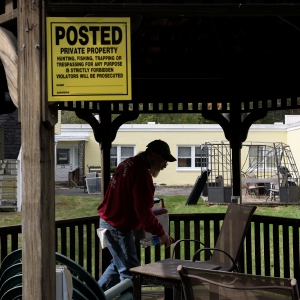Vermont program aims to boost number of primary care doctors
| Published: 05-07-2023 6:03 AM |
RANDOLPH — Primary care physicians are hard to find. That shortage is among the factors that make it difficult to get an appointment in the Twin States and beyond.
“It is truly supply and demand,” said Stuart May, CEO of the Morrisville, Vt.-based Lamoille Health Partners.
May noted that Vermont’s population of some 650,000 people is likely to stay relatively steady, so demand for care is unlikely to diminish, even as the state’s primary care doctors age and retire.
To help fill-in that gap, a consortium of federally qualified health centers in Vermont, led by Lamoille Health Partners and including Randolph’s Gifford Health Care, is in the planning stages of establishing a new family medicine residency.
The planned new residency is “great news for rural Vermont, where we have a significant primary care shortage currently,” said Dr. Fay Homan, a family medicine doctor at Little Rivers Health Care’s Wells River clinic who sits on the Green Mountain Care Board’s Primary Care Advisory Group.
About 60% of residents practice within 60 miles of where they complete their training, so the new program could make a big difference in rural physician recruitment in Vermont, she said.
“It’s hard to recruit for rural family medicine because salaries are less, and rural life isn’t always appealing to new grads,” Homan said.
Data from a couple of years ago showed that the state needed 69 new primary care doctors, and that 36% of the current primary care doctors were over age 60, she said.
Article continues after...
Yesterday's Most Read Articles
 Police seek assistance in locating missing Dartmouth student
Police seek assistance in locating missing Dartmouth student
 City cites Claremont property owner over demolition of building
City cites Claremont property owner over demolition of building
 Editorial: Dartmouth lets protesters know where they stand
Editorial: Dartmouth lets protesters know where they stand
 DHMC union organizers say they have enough signatures to force vote
DHMC union organizers say they have enough signatures to force vote
 A Life: Elaine Chase ‘was a very generous person’
A Life: Elaine Chase ‘was a very generous person’
Currently, the state’s only family medicine residency program is based at University of Vermont Medical Center in Burlington, Homan said. It trains six residents annually and most of those who stay in the state stay in Chittenden County.
The consortium of FQHCs working on this new residency program has received a $495,000 grant through the Health Resources Services Administration’s Teaching Health Center Planning and Development Program. The grant is aimed at supporting the group to gain accreditation in the next two years.
The three-year program aims to train about 12 residents a year, May said. Planned training sites are spread across the state. In addition to Randolph and Morrisville, sites include Springfield, Rutland, the Northeast Kingdom and a site in Franklin County.
“It’s very exciting,” Dan Bennett, Gifford’s CEO, said.
Gifford currently has one opening for a family practice physician listed on the career page of its website, but Bennett said he anticipates more such openings to come as more physicians age out and retire. Such openings take months, if not a year, to fill, he said.
Federally qualified health centers are required to accept new primary care patients in order to continue to receive federally funds, but Bennett said the shortage of providers can mean that it takes longer for people to be seen. As a result, people may wind up in the emergency department or in urgent care. He noted that people in the rural communities Gifford serves may have transportation issues that limit their ability to access care elsewhere.
Gifford has clinics in Chelsea and Rochester, Vt., both of which have closed their high schools in recent years. Bennett said sustaining the clinics will depend on finding providers to work there. He said he’s hopeful that the new residency program will help with that.
“It’s important that we be able to remain there and be a resource for people living in those areas,” Bennett said.
One thing May said he hopes will attract residents to the program is its focus on population health. Before completing the residency, trainees will be asked to complete a research project focused on creating an intervention — “something that can really be looked at and deployed” — to address social determinants of health in a specific population, he said.
Once the curriculum is developed, May said it could potentially be deployed to also train other providers such as nurse practitioners and physician assistants.
“There’s already going to be an infrastructure in place,” he said.
Federally qualified health centers are not the only employers struggling to attract primary care providers. After putting a pause on accepting new primary care patients last spring, Dartmouth Health’s primary care practices in the Upper Valley continue to have waiting lists.
“We’ve had some real workforce shortages,” Dr. Elisabeth Wilson, chair of community and family medicine at DH, said.
She said the shortages include providers, as well as all the other people involved in care.
“We’re doing our best to make sure that people have access,” Wilson said. “It’s still a struggle. It’s not just us. This is a real nationwide problem.”
To tackle the workforce challenge, Wilson said DH is looking at how it recruits and retains all members of its health care teams amid challenges such as burnout remaining from the COVID-19 pandemic.
“We’re building back up,” she said.
Residency programs such as the one being planned in Vermont are part of the solution, she said. A similar program is in the works in Coos County in New Hampshire and a new family medicine program based out of Cheshire Medical Center, a DH affiliate, in Keene, N.H. also is expected to welcome its first six residents next year. The Cheshire program is to have a focus on LGBTQ+ health care and on care for people with substance use disorders.
“We want people working in communities,” Wilson said. So to “think about training them in communities is pretty exciting. … It’s really about supporting the needs of our population.”
Nora Doyle-Burr can be reached at ndoyleburr@vnews.com or 603-727-3213.






 Developer seeks to convert former Brookside nursing home to apartments
Developer seeks to convert former Brookside nursing home to apartments
